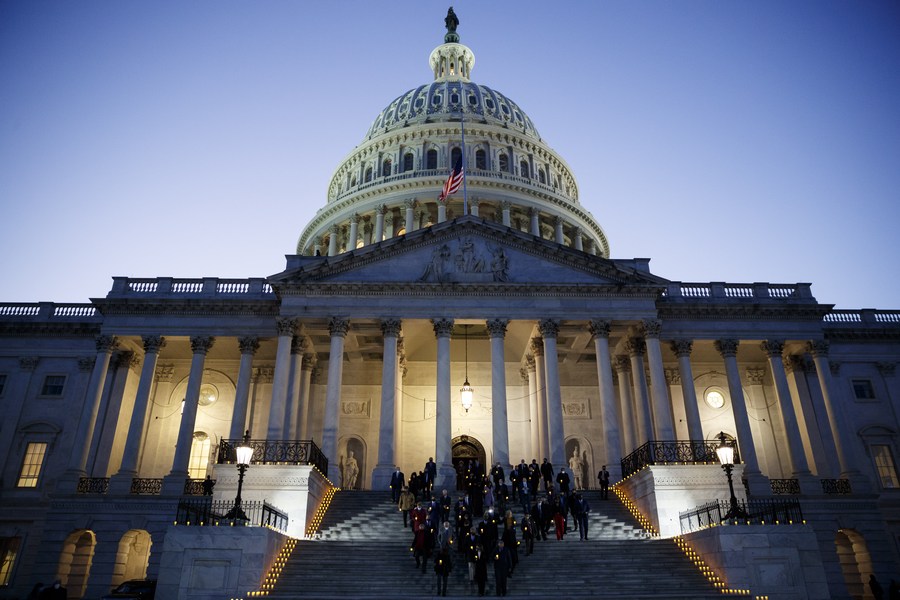Faltering U.S.-led alliance behind democracy circus

A bipartisan group of members of U.S. Congress participate in a moment of silence for the 500,000 American lives lost to COVID-19 on the steps of the Capitol in Washington D.C., the United States on Feb. 23, 2021. (Photo by Ting Shen/Xinhua)
BEIJING, Dec. 14 (Xinhua) -- The so-called "Summit for Democracy" finally ended up amid waves of criticism and doubts from both within and without the United States.
In the name of reviving democracy, the United States handpicked participants for the political farce based on its own interests and preferences. Yet it has not only failed to fool the global community, but actually further exposed Washington's discordance with its allies.
A flaw of Washington's approach is "the presumption that all democracies think alike based on their shared commitment to democratic values," argued an opinion piece in The Washington Post.
In fact, the summit once again laid bare the fissures within the so-called U.S.-led alliance.
First, conflicting interests. Guided by the "America First" doctrine, the self-centered Washington has, over the past years, waged tariff wars against many of its allies on cheese, red wine, as well as steel and aluminum products, and spatted with them over aircraft subsidies and digital service taxes. As a result, the alliance suffered a serious setback.
Although the current White House has declared that "America is back," and promised to mend fences with its allies, yet that pledge was reduced to a joke when the United States stabbed France in the back on a huge submarine contract with Australia.
Even more ironic is that while Washington is manipulating Melbourne as a pawn in its anti-China geopolitical game, America's businesses, along with companies of some other countries, are taking over Australia's lost trade share in the Chinese market.
The United States and its allies are also witnessing growing divergences in their respective strategies.
In the face of an ever self-serving Washington, it seems that America's European allies now harbor a growing doubt over whether they can rely on the so-called "Transatlantic Alliance" for their security. Calls in Europe are thus multiplying to ensure its "strategic autonomy."
"The classic example is exactly their (Group of Seven members) attitude towards China," observed Martin Jacques, a senior fellow at Cambridge University.
Indeed. Despite Washington's unremitted attempt to woo its European allies to join a strategic competition with Russia and China, most of them reject "decoupling" with China.
"It's very important that we don't ... bias our relationship with China," French President Emmanuel Macron told a NATO summit in Brussels in June, calling for cooperation with China on global issues.
Decaying trust is also eroding the U.S. alliance system.
Seeking global domination, the United States has blatantly enraged its European allies by preying on European leaders such as former German Chancellor Angela Merkel with an empire of mass surveillance and espionage it has covertly built over the past years.
And when the United States decided to pull out from Afghanistan earlier this year, it barely consulted with those allies. A British official even asked: "Is America back or has it turned its back?"
"Just as the United States has not been above browbeating its partners, so too has the U.S. often changed its 'friends' for the sake of larger interests," said an article on U.S. news portal Politico.
And as much as one hates to admit it, Washington merely takes its allies as a bunch of servants for its global supremacy. Such a lopsided relationship is not only against the trend of the times, but also can hardly be sustainable in the long run.
Photos
Related Stories
- U.S. not in rightful position to set standards for democracy: Chinese ambassador
- US should look in the mirror before lecturing on democracy
- Global experts share understandings on what's good democracy
- Pirate code has significant influence on development of American democracy
- Inside China Ep.2: What is whole-process democracy in China?
Copyright © 2021 People's Daily Online. All Rights Reserved.










